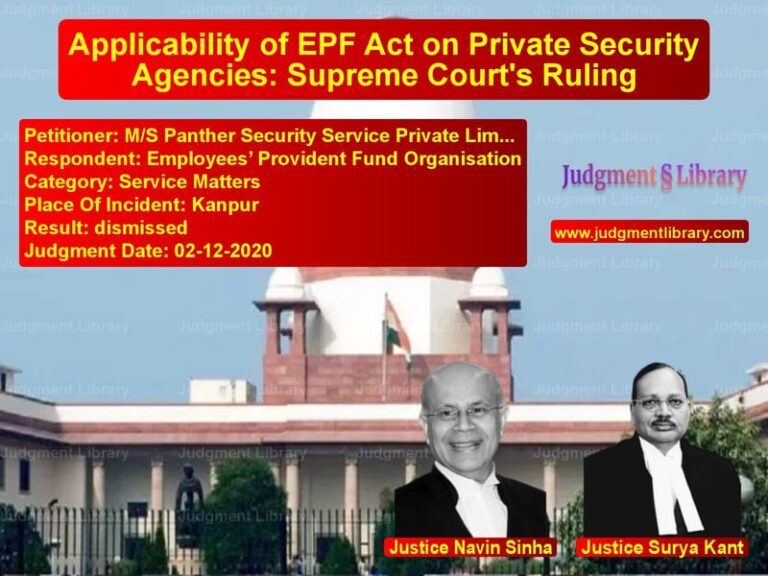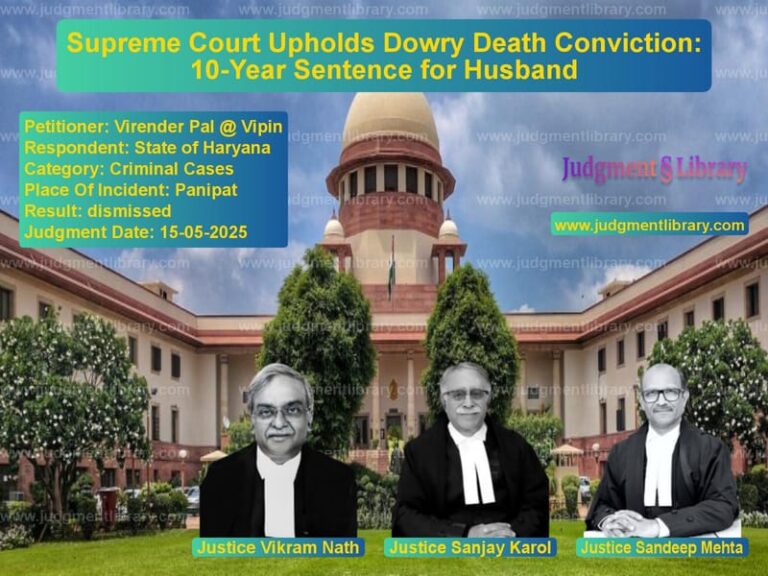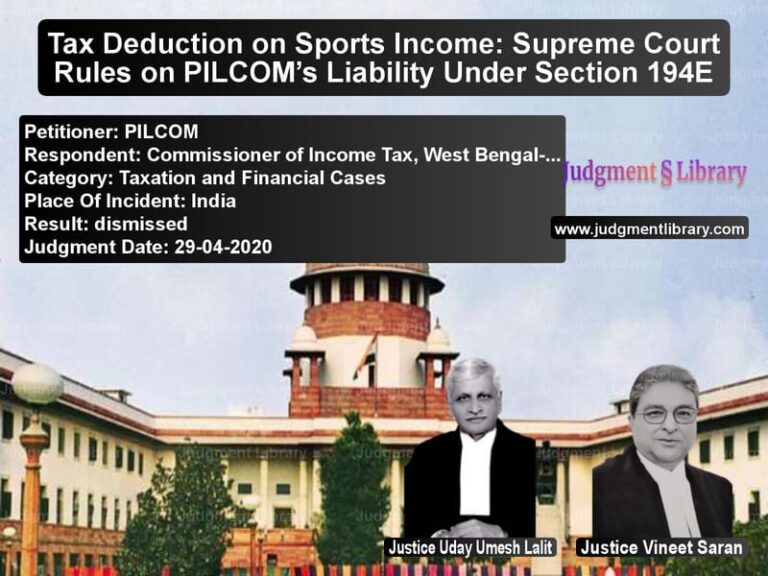Power Purchase Agreement Dispute: CLP India vs. Gujarat Urja Vikas Nigam
The case of CLP India Pvt. Ltd. vs. Gujarat Urja Vikas Nigam Ltd. involves a contractual dispute regarding a Power Purchase Agreement (PPA) signed between the parties in 1994. The core issue pertained to whether CLP India was entitled to receive deemed generation incentives for electricity production despite amendments in government regulations.
Background of the Case
The Gujarat Electricity Board (now Gujarat Urja Vikas Nigam Ltd.) signed a Power Purchase Agreement (PPA) with CLP India Pvt. Ltd. (formerly Gujarat Torrent Energy Corporation Ltd.) on February 3, 1994. The contract stipulated that CLP India would supply 635 MW of electricity for a tenure of 20 years.
At the time of signing the agreement, the tariff for power supply was determined by the Electricity Supply Act, 1948. The tariff, including an incentive scheme for power generation, was set by a government notification dated March 30, 1992. This notification provided an incentive for power generation above 68.5% plant load factor (PLF).
However, on November 6, 1995, the Central Government issued an amendment to the 1992 notification, which stated that the deemed generation incentive was no longer payable to power plants using naphtha as fuel. The dispute arose because CLP India continued to claim deemed generation incentives despite the amendment.
Key Issues
- Was the 1995 amendment applicable to the pre-existing Power Purchase Agreement?
- Could Gujarat Urja seek a refund of incentive payments already made?
- Did the limitation period apply to Gujarat Urja’s claim?
- Was CLP India entitled to interest on a deemed loan component?
Arguments of the Petitioner (CLP India Pvt. Ltd.)
CLP India contended that:
- The amendment issued on November 6, 1995 was prospective and could not alter a contract signed in 1994.
- Its power plant was gas-based, and the restriction on incentives applied only to fully naphtha-based power plants.
- For almost a decade, Gujarat Urja continued to pay incentives, which indicated acceptance of CLP’s interpretation.
- It had invested ₹ 53.90 crores as “own capital” for the project, and interest should be payable on this amount from 1997 onwards.
Arguments of the Respondent (Gujarat Urja Vikas Nigam Ltd.)
Gujarat Urja argued that:
- The 1995 amendment was statutory and binding on all existing PPAs, including the one with CLP India.
- The incentives paid to CLP India between 1997 and 2005 were erroneous and should be refunded.
- The contract included a “Change in Law” clause, which meant any new government regulation was applicable to the PPA.
- The claim for interest on the ₹ 53.90 crores was not valid, as the supplementary agreement signed in 2003 only allowed interest from July 1, 2003 to December 31, 2009.
Supreme Court’s Judgment
The Supreme Court ruled in favor of Gujarat Urja, making the following key observations:
1. Applicability of the 1995 Amendment
The Court held that the statutory notification of November 6, 1995 was binding on the PPA:
“In view of the fact that the notification amended on 06.11.1995 was a statutory one, there cannot be any doubt that it was binding upon the parties.”
Thus, the deemed generation incentive was not payable to CLP India beyond 1995.
2. Refund of Incentive Payments
The Court ruled that CLP India was not entitled to retain the incentives paid after 1995. However, the claim for refund was restricted to the period of three years before the filing of the petition due to the Limitation Act.
“The concurrent findings of GERC and APTEL limiting the refund period are reasonable and do not warrant interference.”
3. Interest on Deemed Loan Component
The Court rejected CLP India’s claim for interest on the ₹ 53.90 crores prior to July 1, 2003:
“Once having settled for a specified sum on deemed loan, CLP cannot claim interest for any period prior to 01.07.2003.”
Impact of the Judgment
This ruling has significant implications for power sector agreements:
- It reinforces that statutory amendments apply to ongoing contracts.
- It upholds the principle that contractual incentives must comply with government policies.
- It clarifies the scope of limitation periods for refund claims.
- It restricts retrospective claims for interest on deemed capital investments.
Conclusion
The Supreme Court’s judgment in CLP India Pvt. Ltd. vs. Gujarat Urja Vikas Nigam Ltd. establishes an important precedent for contractual disputes in the power sector. The ruling underscores that government amendments take precedence over pre-existing agreements and that claims for incentives or refunds must be timely and legally justified. This decision provides clarity on how changes in law impact long-term power purchase agreements and ensures fair treatment for both electricity suppliers and consumers.
Petitioner Name: CLP India Pvt. Ltd..Respondent Name: Gujarat Urja Vikas Nigam Ltd. & Another.Judgment By: Justice Arun Mishra, Justice Vineet Saran, Justice S. Ravindra Bhat.Place Of Incident: Gujarat.Judgment Date: 06-05-2020.
Don’t miss out on the full details! Download the complete judgment in PDF format below and gain valuable insights instantly!
Download Judgment: CLP India Pvt. Ltd. vs Gujarat Urja Vikas N Supreme Court of India Judgment Dated 06-05-2020.pdf
Direct Downlaod Judgment: Direct downlaod this Judgment
See all petitions in Company Law
See all petitions in unfair trade practices
See all petitions in Bankruptcy and Insolvency
See all petitions in Corporate Compliance
See all petitions in Contract Disputes
See all petitions in Judgment by Arun Mishra
See all petitions in Judgment by Vineet Saran
See all petitions in Judgment by S Ravindra Bhat
See all petitions in dismissed
See all petitions in supreme court of India judgments May 2020
See all petitions in 2020 judgments
See all posts in Corporate and Commercial Cases Category
See all allowed petitions in Corporate and Commercial Cases Category
See all Dismissed petitions in Corporate and Commercial Cases Category
See all partially allowed petitions in Corporate and Commercial Cases Category







